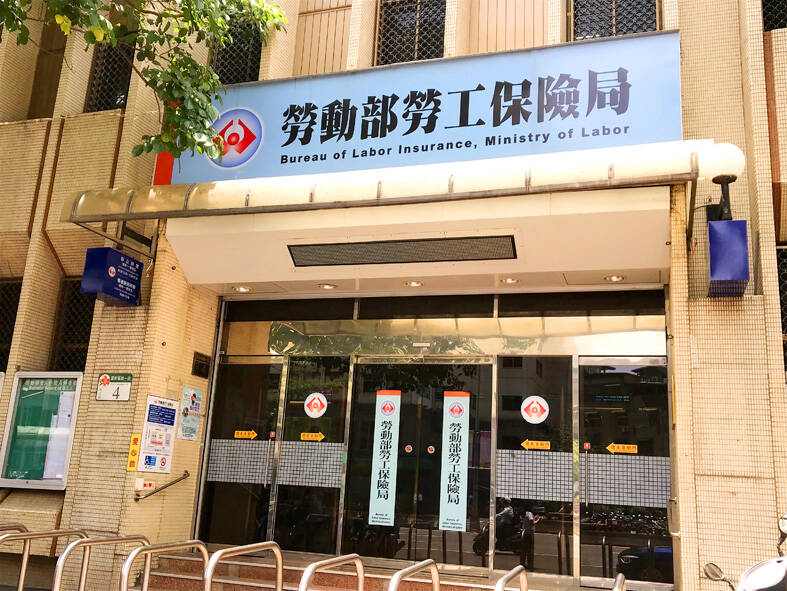Funds managed by the Ministry of Labor’s Bureau of Labor Funds earned returns of more than NT$470 billion (US$14.86 billion) in the first half of this year from their investments in Taiwan’s booming stock market, figures released by the bureau showed earlier this week.
The funds managed by the bureau, such as the Labor Pension Fund, the Labor Retirement Fund, the Labor Insurance Fund, the Employment Insurance Fund and the Arrear Wage Payment Fund, posted gains of NT$470.98 billion during the six-month period, for a rate of return of 8.59 percent.
The funds more than offset the NT$352.9 billion they lost last year, when the TAIEX plunged 4,081.15 points, or 22.4 percent, and Taiwan Semiconductor Manufacturing Co (TSMC, 台積電), the most heavily weighted stock on the local market, lost 27 percent.

Photo: Lee Chin-hui, Taipei Times
In the first half of this year, the TAIEX rose 19.35 percent, while TSMC shares surged about 26 percent, Taiwan Stock Exchange data showed.
The new Labor Pension Fund, launched in July 2015, had NT$3.79 trillion in assets as of the end of June, the most of any of the labor funds, and reported a rate of return of 8.38 percent in the first half, the bureau said.
The Labor Retirement Fund, which has been in place since 1984, had NT$998.8 billion in assets and reported a rate of return of 10.00 percent in the six-month period, the bureau said.
Overall, the funds managed by the Bureau of Labor Funds had combined assets of NT$5.86 trillion as of the end of June and generated NT$178.08 billion in returns in June alone.
That was the third-highest monthly gain on record, trailing only NT$240.23 billion in November 2020 and NT$191.32 billion in November last year, the bureau said.
Bureau of Labor Funds Deputy Director-General Liu Li-ju (劉麗茹) said the funds the agency manages have built positions in electronics stocks because the nation’s electronics industry, including TSMC, has stayed ahead of its peers in terms of global competition.
Judging from the performance of the local stock market last month, Liu said she expected the funds to post a gain of about NT$100 billion for last month. The TAIEX last month rose 229.89 points, or 1.89 percent.
From January 2013 to June this year, the funds have had an average 4.99 percent rate of return, she said.

Vincent Wei led fellow Singaporean farmers around an empty Malaysian plot, laying out plans for a greenhouse and rows of leafy vegetables. What he pitched was not just space for crops, but a lifeline for growers struggling to make ends meet in a city-state with high prices and little vacant land. The future agriculture hub is part of a joint special economic zone launched last year by the two neighbors, expected to cost US$123 million and produce 10,000 tonnes of fresh produce annually. It is attracting Singaporean farmers with promises of cheaper land, labor and energy just over the border.

US actor Matthew McConaughey has filed recordings of his image and voice with US patent authorities to protect them from unauthorized usage by artificial intelligence (AI) platforms, a representative said earlier this week. Several video clips and audio recordings were registered by the commercial arm of the Just Keep Livin’ Foundation, a non-profit created by the Oscar-winning actor and his wife, Camila, according to the US Patent and Trademark Office database. Many artists are increasingly concerned about the uncontrolled use of their image via generative AI since the rollout of ChatGPT and other AI-powered tools. Several US states have adopted

A proposed billionaires’ tax in California has ignited a political uproar in Silicon Valley, with tech titans threatening to leave the state while California Governor Gavin Newsom of the Democratic Party maneuvers to defeat a levy that he fears would lead to an exodus of wealth. A technology mecca, California has more billionaires than any other US state — a few hundred, by some estimates. About half its personal income tax revenue, a financial backbone in the nearly US$350 billion budget, comes from the top 1 percent of earners. A large healthcare union is attempting to place a proposal before

KEEPING UP: The acquisition of a cleanroom in Taiwan would enable Micron to increase production in a market where demand continues to outpace supply, a Micron official said Micron Technology Inc has signed a letter of intent to buy a fabrication site in Taiwan from Powerchip Semiconductor Manufacturing Corp (力積電) for US$1.8 billion to expand its production of memory chips. Micron would take control of the P5 site in Miaoli County’s Tongluo Township (銅鑼) and plans to ramp up DRAM production in phases after the transaction closes in the second quarter, the company said in a statement on Saturday. The acquisition includes an existing 12 inch fab cleanroom of 27,871m2 and would further position Micron to address growing global demand for memory solutions, the company said. Micron expects the transaction to